Croatia Reports 424 New Coronavirus Cases, 22 Deaths
ZAGREB, 6 February, 2021
- Croatia has registered 424 new cases of coronavirus infection and 22 related deaths in the last 24 hours, the national coronavirus response team said on Saturday morning.
The number of active cases currently stands at 2,904. Among them are 1,143 infected people receiving hospital treatment, including 106 who are on ventilators.
A total of 14,315 people are self-isolating.
Since 25 February 2020, when the first case was confirmed in the country, 235,126 people have been infected with the novel virus, of whom 5,144 have died and 227,078 have recovered, including 453 in the last 24 hours.
To date, 1,223,360 people have been tested, including 5,605 in the last 24 hours, the national coronavirus response team said.
For the latest coronavirus news from Croatia, check out the dedicated TCN section.
We Will Return to Our Normal Lives by Summer, Prof Ugur Sahin Tells Večernji List
ZAGREB, 6 February, 2021 - We will return to our normal lives by the summer, Professor Ugur Sahin of Johannes Gutenberg University at Mainz, the co-founder of the biotechnological company BioNTech and creator of the first vaccine against coronavirus, told Večernji List newspaper in an interview published on Saturday.
Asked when the COVID-19 pandemic would stop, Sahin said that it would not stop, but would be brought under control.
"I have no doubts that, if everything goes well in Europe, we will achieve enough control in September, but we will reduce the mortality rate already in March and April. We will be seeing minor outbreaks afterwards because not all people will have been vaccinated. We will have to learn to live with this situation. From time to time there will be severe infections because of non-vaccination or immunosuppression. We will have to live with that, but we will return to our normal lives no later than the summer. That's what I believe," the scientist said.
"We have to see how long the immunity will last after vaccination. The immunity will drop, the virus will change, and at one point we will realise that we need a new vaccine. The question is whether that is five months, 18 months or two years. Right now I don't know. If we see that the vaccine is well-tolerated, there are no serious side effects, we might opt for being vaccinated every year, to be on the safe side. That's one option. But we have to see yet," he added.
Asked if his vaccine could protect against new strains of COVID-19, Sahin said they had so far tested it on the British variant and that the results of the tests on the Brazilian and South African strains would be made public soon.
"The level of protection against the British variant is the same, while it is slightly lower in the case of the South African and Brazilian variants. But that's nothing we should worry about. It is important to say that antibodies are just one level of protection and that there are other levels as well. In any case, we want to assess how a certain strain can change and do a clinical study with one or two variants to see how often changes occur," Sahin said.
Speaking of the future of messenger RNA vaccines, he said that the approval of this vaccine might accelerate approvals for future ones.
For the latest on coronavirus in Croatia, follow the dedicated TCN section.
Slovenia Withdraws Decision on Mandatory COVID-19 Tests for Daily Migrant Workers
ZAGREB, 6 February, 2021 - The Slovenian government has changed its decision under which daily migrant workers were to present a negative coronavirus test on entering the country and undergo testing every seven days.
The decision had been in force less than 24 hours and was changed on Friday after criticisms by opposition parties and complaints by Slovenians who travel every day to Austria and Italy for work.
Under the new decision, daily work migrants do not need a negative COVID-19 test on entering Slovenia if coming from EU or Schengen countries where the epidemiological situation is better than in Slovenia, the government said on Twitter late on Friday.
The decision takes effect on Saturday, 6 February. It also applies to Croatians who travel every day to Slovenia for work, as well as to citizens of other neighbouring countries that have a lower incidence rate of daily COVID-19 cases.
For the latest on coronavirus in Croatia, follow the dedicated TCN section.
New Voice of Entrepreneurs Association Protest on February 26 if Nothing Changes
February 6, 2021 - The Voice of Entrepreneurs Association protest gathered at least 5,000 people on Wednesday in Zagreb, according to estimates. Executive Director of the Voice of Entrepreneurs Association, Dražen Oreščanin, announced the continuation of similar actions if nothing changes, most likely at the end of February.
Index.hr reports:
"At the end of the month, on Friday, February 26, we will again organize a protest at Ban Jelačić Square if the epidemiological situation improves and discriminatory measures against entrepreneurs continue. We are also asking the government for fair compensation for closing facilities because all they give us now is only 25 to 30 percent of the revenue we have lost. In contrast, Germany and Austria's governments, for example, give their entrepreneurs compensation of 70 to 75 percent of the lost revenue and thus save them. This does not only apply to cafes, which are closed, but also in activities such as the event industry, occasional transport, travel agencies, and tourist guides, which can work but due to the measures, they have practically no one, which puts them in a challenging situation," explains the executive director of the Voice of Entrepreneurs Association, Dražen Oreščanin.
He adds that entrepreneurs are asking the government to finally adopt a "corona traffic light" based on which it would be determined which epidemiological measures are being adopted in which conditions. He notes that something like this should be adopted at the regional level, which would enable entrepreneurs and citizens to prepare for certain measures.
Oreščanin emphasizes that entrepreneurs are not against epidemiological measures, but they are against their selective application, so some entrepreneurs are denied the right to work.
"We do not interfere in epidemiological measures; we respect them. We also called at the protest that all those gathered adhere to epidemiological measures. However, we demand that the government treat us all equally and that we all have equal rights," Oreščanin said.
He also criticizes the government for insufficient communication with entrepreneurs and calls out the Voice of Entrepreneurs for politicking, which he strongly rejects. Entrepreneurs, he says, are on the brink, and their situation is deteriorating. In such conditions, they have no choice but to take to the streets and warn of problems.
"We expect the government to start behaving like governments in democracies finally. Instead of communicating with us, it tries to discourage and discredit us and throws spins to portray us as enemies of the Headquarters and the state. But that's not the case, the government doesn't communicate with us," points out Oreščanin.
But all this comes at a price, and in the crisis, which continues this year, the state treasury will hardly have enough money to feed all appetites. Especially if it turns out that the recovery will go much slower than expected.
In such conditions, economic analyst Damir Novotny warns that the straw of salvation for Plenković's government should be provided by money from EU funds. But, he says, the government will have to work harder for that. First, it should quickly adopt a program to use Union funds and speed up its withdrawal, rather than procrastinate, as before.
"Croatia has a lot of money at its disposal, allocated by Brussels, a total of over 20 billion euros, and that money should be used. The government must not bureaucratize and delay but should adopt a plan for using that money. That money can save us from social collapse because the implementation of the projects financed by it will stimulate economic growth and demand for labor," Novotny explains for Index.
Novotny also sees a chance to hire an increasing number of unemployed in the reconstruction of Zagreb and other areas affected by the earthquakes. Reconstruction projects will require a lot of manpower and various profiles.
He also says that he does not expect major social unrest in Croatia for the time being. Still, he also warns that the continuation of the corona crisis also means the collapse of some companies, which will result in higher unemployment. The domino effect could also be social unrest.
"If the crisis continues, there will be social problems," Novotny said.
However, Croatia should also start working on the challenges that await it even after the corona crisis. Namely, it is already clear, Novotny points out, that it will take years for tourism to return to the levels before the outbreak of the coronavirus pandemic, and companies will have to survive in that period as well. He also believes that several activities, including catering, should work on digitally transforming their business. Besides, companies should no longer be put in a position if they have not accumulated enough capital for future crises.
"Changes in the structure of the Croatian economy can be expected. The importance of modern industry and construction will increase, and the role of tourism and catering will decrease. Also, we will have to try to attract more foreign investment," Novotny concluded.
To read more about COVID-19 in Croatia, follow TCN's dedicated page.
Zagreb Police Release Video of Raid in Restaurant, 34 People Were Present
February the 6th, 2021 - Zagreb police have had their hands full of late trying to make sure measures preventing the work of gyms, cafes, restaurants and other such facilities deemed ''risky'' by the epidemiological profession aren't broken. They recently released footage of their raid on a Zagreb restaurant which was working illegally in which 34 people were present.
As Poslovni Dnevnik writes, during this action undertaken by the Zagreb police, a total of 34 people were found, identified and checked in the aforementioned Zagreb restaurant which was open illegally.
There was no use of coercive measures in the conduct of the police officers and eight persons were found without
wearing protective masks, for which reason the police officers issued them four Notices of Misdemeanor and four fines were issued for the misdemeanor referred to in Article 47, paragraph 2, item 9 of the Law on Protection of the Population from Infectious Diseases.
In addition, officials of the Directorate of Civil Protection (commonly referred to as the National Civil Protection Headquarters) found violations of Croatia's curren epidemiological measures contrary to the Decision on necessary epidemiological measures restricting gatherings to prevent the transmission of COVID-19.
Due to performing catering and hospitality activities contrary to the decisions of the Civil Protection Headquarters of the Republic of Croatia, officials of the State Inspectorate, Tourist Inspection, Zagreb Regional Office found a violation of Article 9-A of the Catering Act and issued an oral decision banning the restaurant's work - again.
The part of the premises where the currently illicit activity of serving food and beverages was performed and recorded by the Zagreb police was sealed off for a minimum of thirty days, and misdemeanor proceedings will be initiated against the legal and responsible person.
After the raid by the Zagreb police was over, as part of the criminal investigation, the restaurant's 32-year-old director, as the responsible person, was brought to the official premises of the Zagreb Police Administration for criminal investigation on suspicion of committing the criminal offense of "Spreading and Transmitting Infectious Diseases" and after the completion of the criminal investigation, he will be handed over to a custody supervisor.
For the latest travel info, bookmark our main travel info article, which is updated daily.
Read the Croatian Travel Update in your language - now available in 24 languages.
Minister Vili Beros: I Believe We'll be Able to Relax Measures on 15th
February the 6th, 2021 - Minister Vili Beros is clearly feeling confident about Croatia's continued excellent trends when it comes to the epidemiological picture, as the infection rate remains low. He stated that he ''believes'' Croatia's current anti-epidemic measures could start being relaxed as of the 15th of this month.
As Poslovni Dnevnik writes, new strains of the novel coronavirus have now been confirmed in 70 countries, while they haven't yet been found in Croatia. When asked if we were just extremely lucky in that regard, Minister Vili Beros answered for RTL Direct:
"I don't know how crazy our luck has been, but I know that we made sure to look at everything, including our measures at the borders, so that this new strain wouldn't manage to arrive. Back in December last year, the British Consortium for the research of the genome of COVID-19 detected that there were several variants of the virus circulating. We know of the British B117 strain, which is now present in 45 countries, and there is local transition in 13 countries.
The spread of this virus is somewhat more rapid and therefore we believe that the regions where the incidence of newly infected people is highest can be identified and this could indirectly indicate the existence of such new variants of the virus. There is also the South African variant which is present in 11 countries and in some of our neighbouring countries. All of this leads to extra caution. We're taking all of these elements into account when determining any measures.
There's no clear data that there is such a hotspot in Croatia in which the infection would spread faster and thus indirectly indicate the presence of new variants. But we can only find out by sequencing, and we're just adapting to the need for that sequencing. We've engaged a number of healthcare and scientific capacities to do the same. The European Centre for Disease Control and Prevention will provide sequencing for Croatia and all other European countries, in the form of 200 samples per week. They're also bearing the cost of transport and evaluation. We don't have the clinical parameters that would indicate such a thing,'' Minister Vili Beros explained.
He also referred to neighbouring Slovenia's failure to fight the spread of the novel coronavirus.
"I'm not full aware of the details of their epidemiological situation. It's clear that there's no universal recipe for solving the issue of this epidemic. From day to day it's necessary to evaluate a number of parameters, medical and non-medical ones, and to balance between those measures aimed at preserving health and those aimed at preserving economic activities. That balance is extremely difficult to find. I believe that is the cause of what's going on there. I believe that Slovenia is just as responsible as Croatia,'' he said.
He then answered the question of whether he is planning evaluate some illogical things, such as the big crowds on Sljeme etc.
"Everything that is determined through the introduction of any measures makes some sense. But overall compliance and non-compliance represent a spectrum in the epidemic. This isn't typical only for Croatia but for all European countries. In other countries, too, illogicalities are present. When we talk about coffee ''to go'' options for coffee shops and petrol stations... Well, are petrol stations a place to hang out, talk and sit around? No, they’re for refueling vehicles, and we can take coffee to go there, too, but after that we leave.
However, coffee can be taken ''to go'' from a bakery in the city, and so you end up with 20 people standing in front of it with coffee, the journalist pointed out and asked: Why is that allowed, and those from who have cafes aren't allowed? Are you going to revise some of these things on February the 15th to make more sense?
"I believe that the epidemiological situation will continue to be stable and that there will be no new outbreaks or variants and that we'll as such be able to evaluate all these elements and continue to slowly relax the measures. However, we do need to remain extremely careful because there can be no room for impatience. Everything needs to be done very carefully and with a lot of thought in mind. It isn't the goal of any of us to act restrictively. We act on those segments of life that the epidemiological profession deems to be risky,'' concluded Minister Vili Beros.
For the latest travel info, bookmark our main travel info article, which is updated daily.
Read the Croatian Travel Update in your language - now available in 24 languages.
Flower Square Zagreb: Croatian Cafe Lifestyle... without the Cafe
February 5, 2021 - The new business meeting etiquette takes some getting used to in Croatia. Flower Square Zagreb, home to the cafe lifestyle without the cafe.
After weeks of being chained to the sofa in my living room in Varazdin, the last few weeks have seen me emerge into the new normal for a few essential meetings all over the region.
It has been a very odd and disorienting experience.
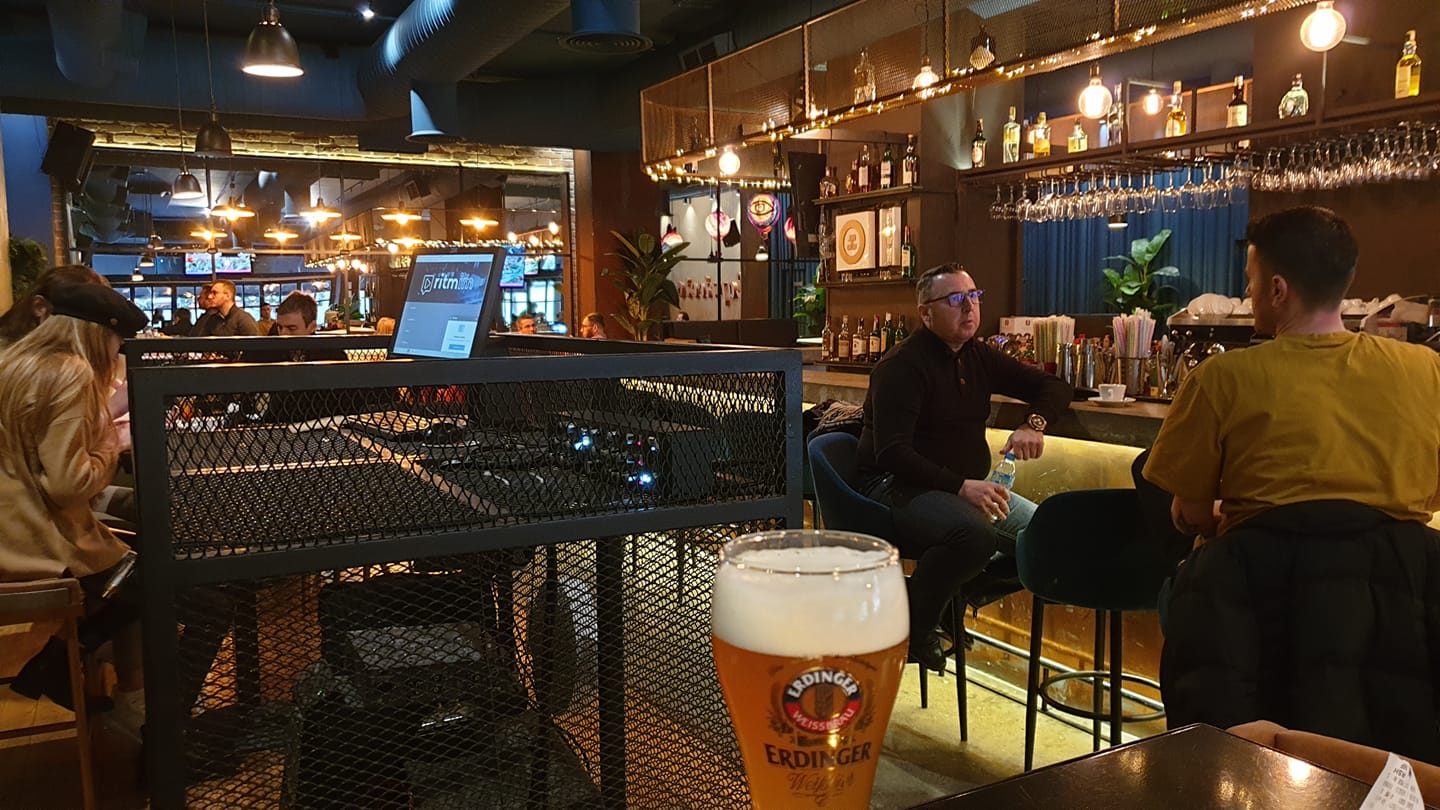
Nothing confused me more than my trip to Tirana last month, leaving Croatia for three nights in Bosnia and Hercegovina, Montenegro and Albania. In all three countries, the rather alien sight of bars and restaurants open, followed by a 22:00 curfew each night. By day two I was hooked, and I can't tell you what a difference it made psychologically to be able to sit in a cafe and have a meeting over a relaxing cold one.
I felt like I had been given a bonus for good behaviour.
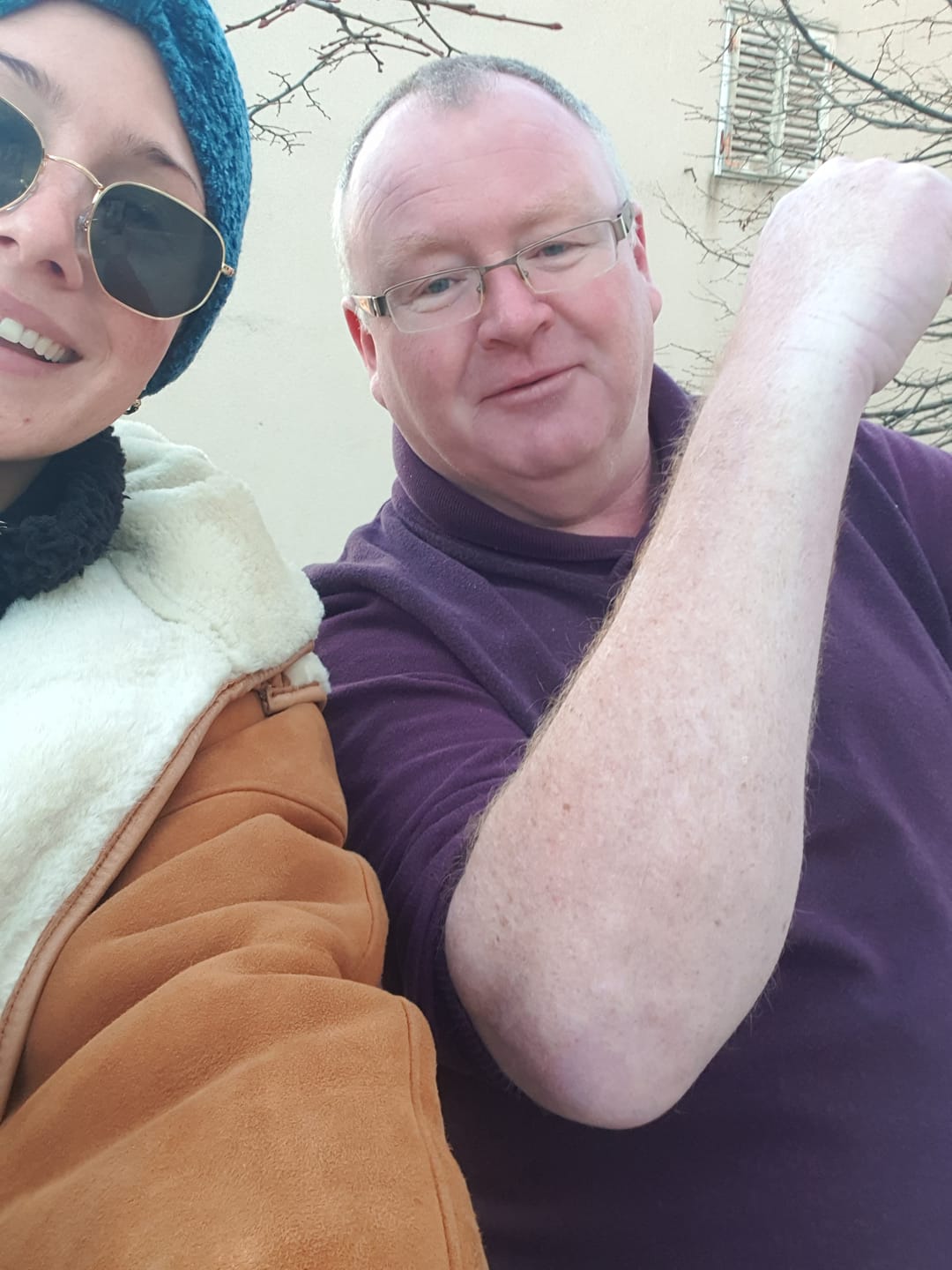
It was soon back to reality on returning to Croatia. It had been weeks since I had had a meeting, and I had not given any prior thought to where I would catch up with young Rogulj for our TCN Split catchup. Minus 1 at 07:45 with nothing open except the supermarket did not look too appealing. But 6,000 steps and many laughs later, we had spent an hour inspecting every square inch of SPAR floorspace.
Relaxing Tirana was just a distant memory.
Zagreb was different, as we looked at recently in the University of Aliens on Mars programme into human behaviour in As Gym Owner Faces Prison, the Virus Must be Laughing at Croatia's Inconsistent Measures.
To be clear, I don't have a public opinion on corona - not that my opinion matters, especially when we have so many experts out there on Facebook - but I do think being consistent is important. The virus would be somewhat bemused to learn that one can have a mixed grill on the Bosnian Riviera, but not on the two parts of Croatia next door. Or that in Croatia, you can huddle up and have the cafe experience, only without the cafe, as this will stop the spread of the virus.
I popped into the bank on Flower Square Zagreb today. it was really lovely. As you can see from the video above, gentle live music, friends enjoying the late morning sun and the relaxed cafe lifestyle.
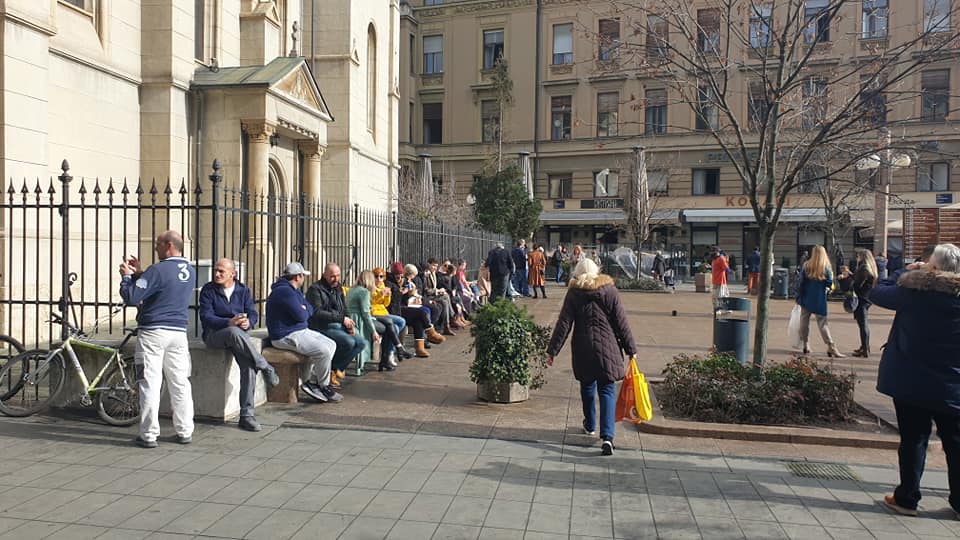
Only without the cafes, which remain shut to prevent the spread of the virus.
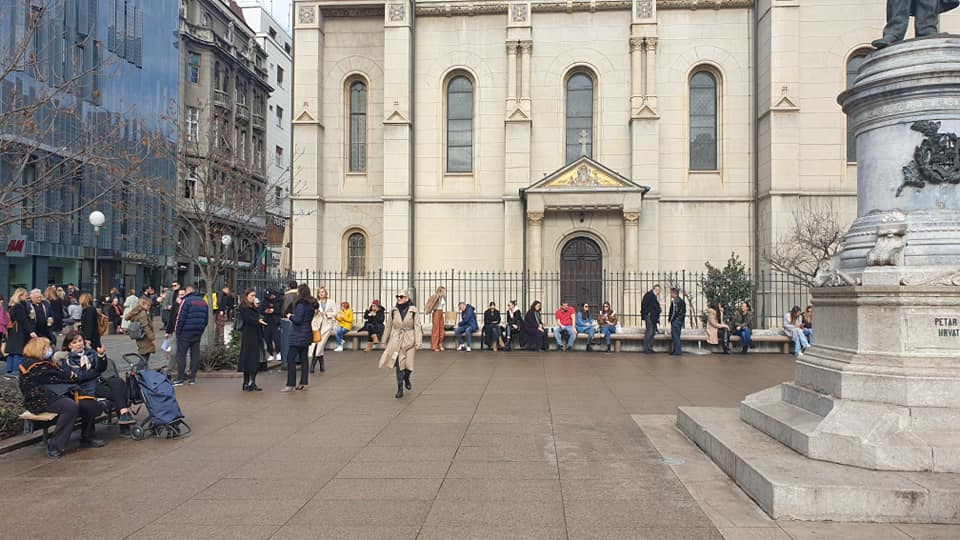
Which has had the effect of boosting the coffee to go business (only it is illegal to order one from a cafe) with people cramming in benches right next to the forbidden cafe terraces.
There is some exceptional Croatian bureaucratic logic at work here, as the catering industry is on its knees. Looking at Flower Square Zagreb today, I think people would be more socially distanced sitting at tables on cafe terraces (and certainly more comfortable) than the situation they are reduced to at present.
Very, very odd. But at least the rumours of a February 15 opening are getting stronger.
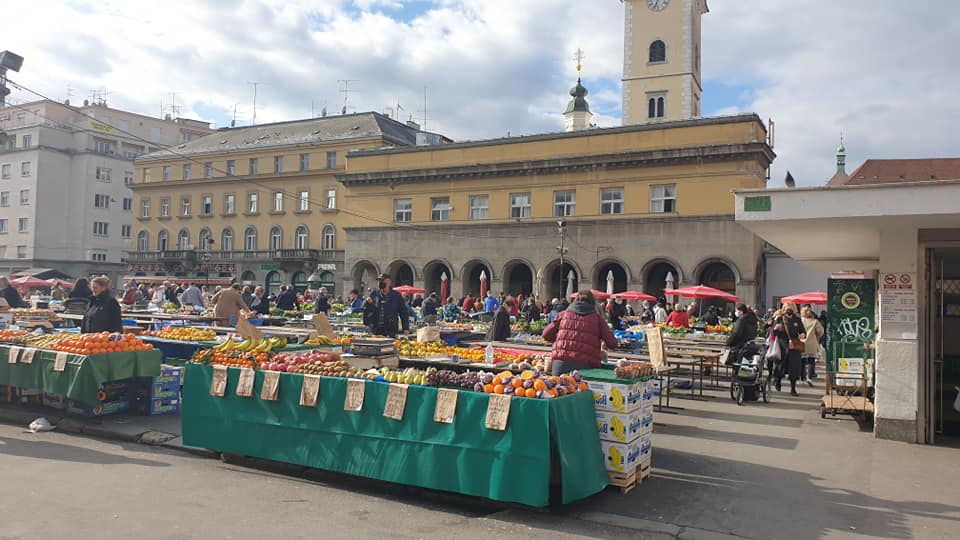
(Dolac Market today)
Follow the latest on coronavirus in Croatia check out the TCN Daily Travel Update.
Croatian Public Health Institute Reveals AstraZeneca Vaccination Plan in Croatia
February 5, 2021 - The Croatian Public Health Institute has revealed the details of the AstraZeneca vaccination plan in Croatia. The first vaccinations will begin next week.
The Croatian Public Health Institute (HZJZ) has announced that the third vaccine against COVID-19 will be available in Croatia next week. It is a vaccine manufactured by AstraZeneca/Oxford, and 150,000 doses of this vaccine should arrive in Croatia in February.
AstraZeneca is intended for people over 18 years of age. Two doses of this vaccine are needed, and the second dose should be given between 8 and 12 weeks after the first dose.
“In clinical studies taken into consideration by the European Medicines Agency, vaccine efficacy is about 60% in disease prevention defined by the presence of at least one of the symptoms of the disease with laboratory confirmation of infection.
The estimated efficacy of this vaccine in the elderly is equal to that in younger adults. Still, in the data taken into account by the European Medicines Agency, it did not prove statistically significant, primarily due to the small number of respondents in older age groups," says HZJZ.
HZJZ also explains that the side effects caused by this vaccine are not unexpected and unusual, and "the only real contraindication for use is hypersensitivity to the components of the vaccine."
According to the HZJZ, there is no maximum age limit for the use of this vaccine.
"Based on the available data on clinical trials of COVID-19 vaccines registered in Croatia by a centralized procedure (via the European Medicines Agency), there is no reason to make a recommendation for vaccination that would differ from the indications approved by the European Medicines Agency, i.e., the minimum age limit for the use of this vaccine is 18 years. There is no maximum age limit."
Based on additional information about AstraZeneca's COVID-19 vaccine, which indicates that:
- it has been shown that a single dose of AstraZeneca vaccine protects about 70% for three weeks after administration and that this protection does not weaken within 12 weeks,
- according to the Summary of Product Characteristics, the recommended interval between the first and second dose is 4 to 12 weeks,
- the final result, i.e., the efficacy after the second dose, is higher when the interval between the first and second doses is greater,
we recommend that the second dose of the AstraZeneca vaccine be given 8-12 weeks after the first dose," concluded HZJZ.
Source: Index.hr
To read more about COVID-19 in Croatia, follow TCN's dedicated page.
Croatia's Coronavirus Update: 549 News Cases, 16 Deaths, 552 Recoveries
ZAGREB, 5 February, 2021 - In the last 24 hours, Croatia has conducted 5,930 coronavirus tests and 549 (10%) have returned positive, while there have been 16 deaths linked to COVID-19, the country's coronavirus crisis management team reported on Friday.
Currently, there are 2,955 active cases, including 1,203 hospitalised patients, of whom 106 are on ventilators.
Croatia's COVID-19 death toll has climbed to 5,122.
Since the outbreak of this infectious disease in Croatia in late February, 1,217,755 tests have been performed, and 234,702 persons have tested positive.
To date, 226.625 people have recovered from COVID-19, including 552 in the last 24 hours.
A total of 13.993 people are self-isolating.
Citizens Rate Croatian Health System's Pandemic Performance
February the 5th, 2021 - Croatia's residents have rated the performance of the Croatian health system throughout the ongoing coronavirus pandemic, with a mixed bag of results.
As Poslovni Dnevnik writes, the availability of healthcare services during the coronavirus pandemic was assessed as good by 42 percent of Croatian citizens, every fifth term of examination, check up or procedure agreed before the pandemic was prolonged. This is part of the results obtained from an exclusive survey conducted by Ipsos for the health portal zelimzdravlje.com.
The results of the panel discussion were commented by the Minister of Health Vili Beros, Dr. Lucian Vukelic, the Director of the Croatian Health Insurance Fund, Dr. Renata Sabljar Dracevac, the President of the Parliamentary Committee for Health and Social Policy and MEPs doc.dr.sc. Tomislav Sokol and Suncana Glavak.
Due to the global pandemic of the novel coronavirus, the Croatian health system has adapted and introduced different ways of functioning, additional traumas with earthquakes have sadly also completely or partially disabled some institutions. The extent to which healthcare is available to Croatian residents is, as stated, the basis of the research conducted by Ipsos for the zelimzdravlje.com portal.
As was previously mentioned, according to the results, 42 percent of citizens rated the Croatian health system as good, and 14 percent rated it poorly. During the pandemic, 41 percent of people had a healthcare service previously agreed upon, of which a mere 16.5 percent managed to realise said procedure, while 11.2 percent of them had their care postponed and didn't receive a new date, and nine percent of the survey's respondents received their new postponed examination, check up or procedure.
The majority of citizens, 58.2 percent of them, managed to contact their primary care physician, 16.5 percent of them managed to do so with difficulty, and 3.1 percent failed to reach their primary care physician entirely.
Respondents who used the Croatian health system during the pandemic mostly felt safe, 48.2 percent of them claimed they did so, and rated the healthcare they received as 4.10. The Croatian health system was rated less safely and more poorly by those who didn't even use health services during the pandemic. It is a result that once again proves the discomfort and fear that the pandemic has caused in people who often decide to postpone necessary healthcare services on their own for fear of coming into contact with the novel virus and/or contracting the infection.
The results were presented at an online panel discussion organised by zelimzdravlje.com, where, as one of the panelists, the Minister of Health Vili Beros said:
''Many more economically stable and stronger countries have the task of dealing with all the challenges of the pandemic. When it comes down to it - our togetherness, our courage, solidarity and care for others is without competition,''
''The pandemic has so far cost the Croatian health system a massive 1.3 billion kuna, '' said Dr. Lucian Vukelic, the director of the Croatian Health Insurance Fund:
''Everything we needed to do, what we put in the budget, we managed to finance, at the end of last year we managed to solve most of the debt to pharmacies. The Croatian health system as such is stable for the time being. One billion and almost 300 million kuna spent so far on COVID-19 is a really big number that we've managed to finance so far,''
''The EU health programme has become independent and has increased by 12 times,'' commented doc.dr.sc. Tomislav Sokol, MEP, who presented the details of that program,me while MEP Suncana Glavak brought a cross-section of the European reaction to the pandemic crisis and the challenges facing Europe.
The experiences of oncology patients in Croatia during the coronavirus pandemic were also discussed.
Necessary examinations, medications and therapies for 58.2 percent of oncology patients in Croatia were made fully available to 58.2 percent of people who required them, were mostly available for 32.2 percent of such individuals, and were sadly unavailable for 9.1 percent of people.
The importance of prevention, but also adequate treatment of cancer, was emphasised by Dr. Renata Sabljar Dracevac in a panel discussion where she announced the relaunch of the initiative MPs against cancer.
For the latest travel info, bookmark our main travel info article, which is updated daily.
Read the Croatian Travel Update in your language - now available in 24 languages.


